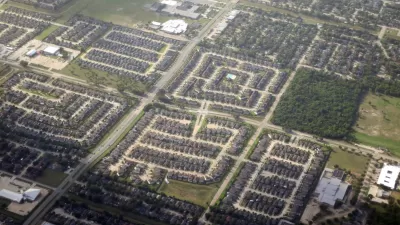Joel Kotkin argues that most U.S. cities that were struggling in the '60s and '70s have forged a comeback and should no longer need the sort of redevelopment and federal attention they've been given.
Kotkin explains his usual position that smaller, less dense urban areas and suburbs have been the true engines of growth, and urban cores are facing massive debt problems and far too much political attention. He sees the shift in power in Congress to more suburban-based Republicans as an opportunity to change direction.
Citing Christopher Leinberger, he says that the redevelopment of downtowns, for better or worse, has had its intended effect:
"As they have developed somewhat stronger downtown cores, lowered crime rates and reduced 'white flight,' the stronger urban cores are better positioned now, though perhaps less so than the boosters believe, to succeed on a market-oriented basis."
He concludes, "Cities need to break their reliance on outside help from a country that is, for the most part, not dense or urban."
FULL STORY: The Next Urban Challenge — And Opportunity

Maui's Vacation Rental Debate Turns Ugly
Verbal attacks, misinformation campaigns and fistfights plague a high-stakes debate to convert thousands of vacation rentals into long-term housing.

Planetizen Federal Action Tracker
A weekly monitor of how Trump’s orders and actions are impacting planners and planning in America.

Chicago’s Ghost Rails
Just beneath the surface of the modern city lie the remnants of its expansive early 20th-century streetcar system.

Bend, Oregon Zoning Reforms Prioritize Small-Scale Housing
The city altered its zoning code to allow multi-family housing and eliminated parking mandates citywide.

Amtrak Cutting Jobs, Funding to High-Speed Rail
The agency plans to cut 10 percent of its workforce and has confirmed it will not fund new high-speed rail projects.

LA Denies Basic Services to Unhoused Residents
The city has repeatedly failed to respond to requests for trash pickup at encampment sites, and eliminated a program that provided mobile showers and toilets.
Urban Design for Planners 1: Software Tools
This six-course series explores essential urban design concepts using open source software and equips planners with the tools they need to participate fully in the urban design process.
Planning for Universal Design
Learn the tools for implementing Universal Design in planning regulations.
planning NEXT
Appalachian Highlands Housing Partners
Mpact (founded as Rail~Volution)
City of Camden Redevelopment Agency
City of Astoria
City of Portland
City of Laramie





























